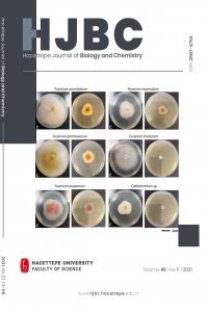Determination of knowledge on the academic staff concerning genetically modified organisms (GMOs)
Akademik personellerin genetiği değiştirilmiş organizmalar (GDO) hakkındaki bilgi düzeylerinin belirlenmesi
___
- 1. A. Holst-Jensen, Sampling, detection, identification and quantification of genetically modified organisms (GMOs), In: Y. Picó (Ed.), Food Tox Anal., (2007) 231.
- 2. A. Holst-Jensen, Testing for genetically modified organisms (GMOs): Past, present and future perspectives. Biotech Adv., 27 (2009) 1071.
- 3. Food and Drug Administration, First biotech tomato marketed. US Food and Drug Administration, Center for Food Safety and Applied Nutrition, (1994).
- 4. C. James, Global status of commercialized biotech/ GMcrops: 2007. International Service for the Acquisition of Agri-Biotech Applications (ISAAA), (2008).
- 5. Royal Society, Genetically modified plants for food use and human health. Royal Society, London. Policy Document 12/03, (2003a).
- 6. I. Christoph, M. Bruhn, J. Roosen, Knowledge, attitudes towards and acceptability of genetic modification in Germany, Appetite, 51 (2008) 58.
- 7. Royal Society, Transgenic plants and world agriculture. Royal Society, London, (2000).
- 8. Royal Society, Genetically modified plants and the environment. Royal Society, London, Policy Document 14/03 (2003b)..
- 9. D. Atkinson, Genetically modified organisms, (Accessed http:// www.sac.ac.uk /info/ External? publications/Gmo.asp., Scottish Agricultural College), (1998).
- 10. KR. Curtis, JJ. McCluskey, TI Wahl, Consumer acceptance of genetically modified food products in the developing world, AgBioForum, 7 (2004) 69.
- 11. WHO, Modern food biotechnology, human health and development: An evidence-based study (http://www. who.int/foodsafety/publications/biotech/biothec_ en.pdf) (Accessed June, 2008).
- 12. CJ. Wachenheim, Consumer acceptance of genetically modified food products, AgBiotecholNet 6 (2004) 1.
- 13. B. Karli, A. Bilgic, B. Miran, Consumers perceptions about genetically modified foods and their stated willingness to pay for genetically modified food labeling: evidences from Turkey. Southern Agricultural Economics Association Annual Meeting, Dallas-Texas, February 2-6, (2008) 1.
- 14. R. Pardo, C. Midden, JD. Miller, Attitudes toward biotechnology in the European Union. J Biotech, 98 (2002) 9.
- 15. J. Huang, H. Qiu, J. Bai, C. Pray, Awareness, acceptance of and willingness to buy genetically modified foods in urban China. Appetite 46 (2006) 144.
- 16. L. Lan, Chinese public understanding of the use of agricultural Biotechnology. A case study from Zhejiang Province of China, J. Zhejiang Univ. Sci. B., 7 (2006) 257.
- 17. A. Demir, A. Pala, Genetiği değiştirilmiş organizmalara toplumun bakış açısı. Hay Üret Derg 48 (2007) 33.
- 18. J. Februhartanty, TN. Widyastuti, DN. Iswarawanti, Attitudes of agricultural scientists in Indonesia towards genetically modified foods, Asia Pacific J. Clinical. Nutr., 16 (2007) 375.
- 19. I. Ergin, ŞT. Gürsoy, ZA. Öcek, M. Çiçeklioğlu, Sağlık meslek yüksek okulu öğrencilerinin genetiği değiştirilmiş organizmalara dair bilgi tutum ve davranışları, TAF Prev. Med. Bull., 7 (2008) 503.
- 20. E. Özgül, İ. Aksulu, Ambalajlı gıda ürünlerinde tüketicilerin etiket duyarlılığındaki değişimler (http:// eab.ege.edu.tr/pdf/6_1/C6-S1-M1.pdf) (2009).
- 21. N. Koçak, T. Türker, S. Kılıç, M. Hasde, Tıp fakültesi öğrencilerinin genetiği değiştirilmiş organizmalar hakkındaki bilgi, tutum ve davranışlarının belirlenmesi, Gülhane Tıp Derg., 52 (2010) 198.
- 22. F. Maekawa, D. Macer, How Japanese students reason about agricultural biotechnology, Sci. Eng. Ethics, 10 (2004) 705.
- 23. F. Sağlam, A. Gümüş, B. Dokcan, Tüketicilerin besin satın alımına ilişkin bilgi tutum ve davranışları, Beslen. Diyet. Derg., 28 (1999) 39.
- 24. AT. Bayraç, MC. Baloğlu, G. Kalemtaş, M. Kavas, Genetiği değiştirilmiş organizmalar. Ankara: ODTÜ Geliştirme Vakfı Yayıncılık, (2007) 34.
- 25. MK. Magnusson, UKK. Hursti, Consumer attitudes towards genetically modified foods, Appetite, 39 (2002) 9.
- 26. G. Gaskell, N. Allum, W. Wagner, N. Kronberger, H. Torgersen, J. Hampel, GM foods and the misperception of risk perception, Risk. Anal., 24 (2004) 185.
- ISSN: 2687-475X
- Yayın Aralığı: 4
- Başlangıç: 1972
- Yayıncı: Hacettepe Üniversitesi, Fen Fakültesi
Hayriye Esra AKYÜZ, Mehmet AKYÜZ
Ornidazol’ün Farmasötik Dozaj Formlarından Valide Edilmiş RP-HPLC Metodu ile Belirlenmesi
Senem ŞANLI, Tuğrul YILDIRIM, Bediha AKMEŞE, Nurullah ŞANLI
Oğuz AKPOLAT, Mustafa KOCAKULAK, Hakan AYHAN, Fatma AYHAN
Jelatin/Okside Dekstran Kriyojeller: In-Vitro Biyouyumluluk Değerlendirilmesi
Sedat ODABAŞ, İlyas İNCİ, Erhan PİŞKİN
Nurullah AKCAN, Besi SERİN, Fikret UYAR
Gelatin/oxide-dextran cryogels: In-vitro biocompatibility evaluations
İlyas İNCİ, Sedat ODABAŞ, Erhan PİŞKİN
Vibrational spectroscopic study of 6-aminouracil tetracyanonickelate complexes
